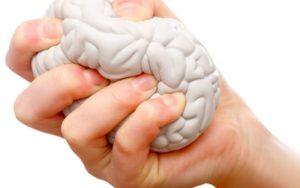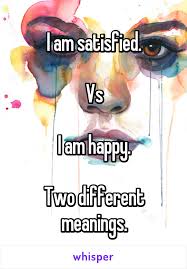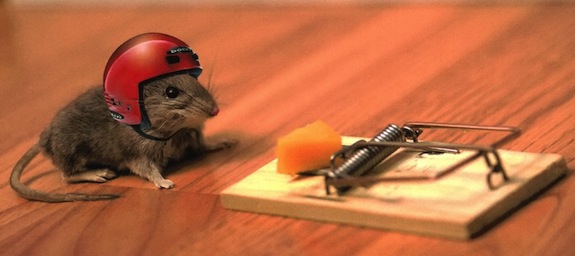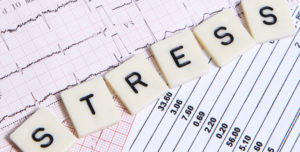 Stress. We all feel it. It’s a deadline that seems impossible. Perhaps it’s a goal that’s slipping out of reach. Maybe it’s a relationship that’s changing, or just “change” itself. Job is gone. Money’s short. I’m overweight. The kids.
Stress. We all feel it. It’s a deadline that seems impossible. Perhaps it’s a goal that’s slipping out of reach. Maybe it’s a relationship that’s changing, or just “change” itself. Job is gone. Money’s short. I’m overweight. The kids.
Operationally, we understand stress as a state of mental or emotional strain or tension resulting from adverse or very demanding circumstances.
The American Institute of Stress (yes, there’s an institute for everything) allows that stress can be a driver as well as a destroyer. Understanding the stress from a particular stressor (the response to an individual stimulus) is extremely subjective.
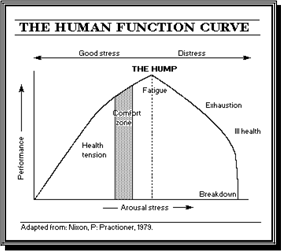 “As illustrated to the left, increased stress results in increased productivity—up to a point, after which things go rapidly downhill. However, that point or peak differs for each of us, so you need to be sensitive to the early warning symptoms and signs that suggest a stress overload is starting to push you over the hump. Such signals also differ for each of us and can be so subtle that they are often ignored until it is too late. Not infrequently, others are aware that you may be headed for trouble before you are.”
“As illustrated to the left, increased stress results in increased productivity—up to a point, after which things go rapidly downhill. However, that point or peak differs for each of us, so you need to be sensitive to the early warning symptoms and signs that suggest a stress overload is starting to push you over the hump. Such signals also differ for each of us and can be so subtle that they are often ignored until it is too late. Not infrequently, others are aware that you may be headed for trouble before you are.”
For me, stress becomes noticeable when some expectation is not met. I usually feel immediate frustration, which, if not dealt with, can and often does lead to personal distress and the associated mental and physical responses. My personal favorite is tightening of the shoulder muscles, but I have several others.
Eu-stress, as researchers have termed the productive version of stress, is that motivator that helps me lean. For example, I experience stress when I don’t know what to do, so I learn how to do it in order to reduce that stress. It’s how we grow, learn, adapt.
I have a favorite story about turning stress into success. As an infant, I crawled a lot on a hardwood floor. Between our dining room and living room was an oak door “saddle”—an approximately ¾-inch piece of wood on the floor in the archway that divided one room from the other. I suppose a door had been there at some time.
I would scoot on my knees from one room to the other banging said knees on this offensive piece of wood repeatedly… scoot, scoot… bang, bang… scoot, scoot. In this case, simple pain was the stressor stimulus, and pain contributed to the stress.
One evening, as my dad told me, without any help from an adult, I scooted to the saddle, checked up, crawled to my stubby little feet, took two wobbly steps over the saddle, dropped to the floor, and continued scooting. Those, I’m told, were my first steps. Never banged my knees again. See? Good stress… pushing me to grow, adapt, and learn.
But sometimes we just keep banging our knees, never adapting, continuing to experience the pain (stress). That’s where stress gets out of hand and becomes damaging.
How can some folks look stress right in the eye and make adjustments to lower the pain while others just endure it? Again, it’s clearly subjective.
I’ll look at it in the language we’ve defined here. Stress, it seems, is the product of our knower/judger persona. It’s the judging part where “that’s not supposed to happen,” or “I can’t deal with any more revisions.” Our history gives us the rules for all situations, and, when what’s happening doesn’t fit those rules, it’s an unmet expectation.
Now clearly there are many situations where my K/J will carry me through a situation just fine. I know what to do and my judgment is accurate and I execute appropriately.
But other times, my judgment is inaccurate, so my execution is inappropriate and I’m stressed.
Enter the learner/researcher persona, if we can access it. It opens the possibility that my rules don’t fit what’s happening. That my judgment is inaccurate and that the product of those components leads to an inappropriate interpretation… and stress.
I now have a choice. Remember these words of Viktor Frankl? “Between stimulus and response there is a space. In that space is our power to choose our response. In our response lies our growth and our freedom.”
This choice point is that space. But it requires accessing the L/R to detect it. Without that ability, the offensive stimulus (stressor) will continue to be judged as bad for me, and will continue to contribute to the associated physical and emotional reactions.
So what’s stressing you today? What about it offends you (your K/J, actually)? What can your L/R adjust in expectations to lower that stress and relieve you of those painful knees?

